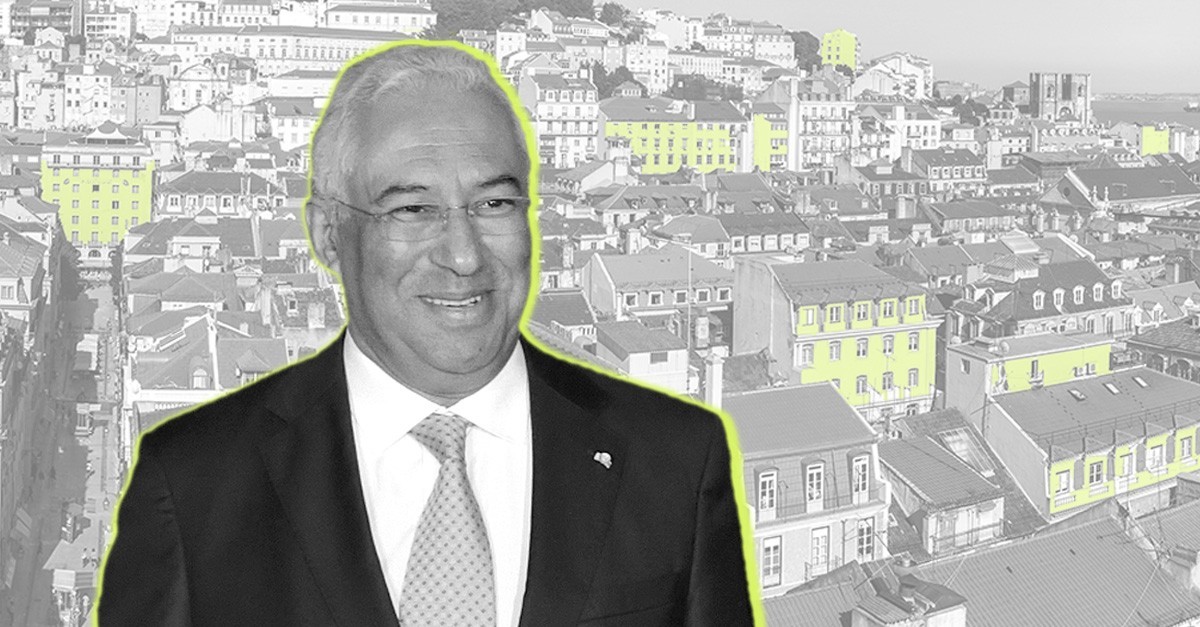
Without having managed to give an effective answer to the housing crisis, which for several reasons has been worsening in Portugal in recent years, Portuguese Prime Minister António Costa has now decided to present a new plan of attack, called "Mais Habitação", which literally means "more housing". With this new programme, the Portuguese Government promises to increase the supply of houses in the market and to facilitate the access to affordable housing in the medium term, but also to solve more immediate problems for households that need support, both when it comes to rentals and mortgages. In order to achieve this, the absolute majority Government has now opted for a direct intervention in the market, with several measures that are already generating controversy, such as the end of golden visas, the introduction of a limit to the increase of rent the penalisation of Local Accommodation (AL), the possession of empty houses, with the State assuming an ambivalent role of landlord-tenant.
To justify this strategy, the socialist leader argues that, in constitutional terms, the "right to property" cannot override other fundamental rights, such as the "right to housing". The opposition and several players in the real estate sector and the economy have already spoken out against it, and a month of strong debate on the subject is expected in civil society and in Parliament. The legislative package, approved in February in a Council of Ministers dedicated to housing, is now in public consultation and only on 16th March, in a new meeting of the Executive, will the measures be approved - some resulting from Government initiatives and others through bills presented to Parliament.
As the increase of the supply of houses available to buy and rent in Portugal is one of the top priorities now assumed by the Government, the "Mais Habitação" measures contemplate, on the other hand, incentives to put properties up for rent, through tax benefits to owners, as well as the creation of mechanisms to simplify the licensing processes and the use of land to create new accessible housing, through modular construction.
For households in Portugal, faced with a loss of income and purchasing power, support was designed for renting and home loans, both directly and through mechanisms such as the exemption of capital gains from the sale of houses to pay off loans.
To help understand everything that is on the table, idealista/news has analysed the "Mais Habitação" package of measures with a magnifying glass, which provides a total investment of 900 million euros. These are all the details.
The Government's path towards the "Mais Habitação" package
"The housing issue is today a central and transversal concern in Portuguese society, since it concerns not only the neediest families, but also particularly young people and middle-class families," the Prime Minister began by saying at a long press conference following the Council of Ministers, accompanied by Marina Gonçalves, Portugal's Housing Minister, and Fernando Medina, Finance Minister.
The path to change the housing crisis currently being experienced in Portugal began, the Government says, as far back as 2016, with the launch of the New Generation of Housing Policies and the approval of the basic housing law. More recently, the Ministry of Housing was created, led by Marina Gonçalves, and the National Housing Programme was launched, replacing the National Housing Strategy (ENH), created in 2015. Added to all this are the funds from the Recovery and Resilience Plan (RRP) that will reinforce the public housing stock with 26,000 new homes by 2026.
"The More Housing package is a programme focused on people, which aims to respond to the urgent social need to provide more housing and affordable housing for families to cope with the increase in rents or credit payments," Fernando Medina, Minister of Finance.
The point is that the economic context changed - and a lot - during 2022, with the outbreak of war in Ukraine, which generated an energy crisis, pushed up inflation and increased interest on housing loans. "No-one can ignore the impact on the housing market, whether it be the rise in interest rates or the significant increase in rents on the market," António Costa stressed.
And it was for this very reason that the Council of Ministers approved the "Mais Habitação" package of measures, which aims to "act in all dimensions of the housing problem", which, as a whole, will cost 900 million euros. This does not include the "works to be carried out on the land, nor the rent that may be paid by the Government", for example, clarified Fernando Medina, Minister of Finance, on the occasion. The amount will be mobilised through the State Budget.

1st area of action: Increase market supply with the reconversion of commerce into houses
To increase the supply of houses in the Portuguese residential market - an issue long raised by the market -, António Costa outlined two measures:
- Converting the use of properties from commerce or services to housing use
Land or buildings authorised for commerce and services will be able to be used for construction or converted into housing, without requiring any alteration to land use plans or licences.
- Making land and buildings available for the construction of affordable housing
With this new legislative package, the State will now make available land or buildings, under housing development contracts, which can be assigned to cooperatives or private individuals, so that these entities can develop affordable housing.
On this point, the Government said that two tenders will be launched on a set of lands specifically dedicated to modular construction. One of the tenders will be launched in Porto, in Quinta do Viso, where around 70 modular homes will be built. The other tender will be open in Lisbon, at Quinta da Alfarrobeira, for around 350 homes.

2nd area of action: Simplify the licensing processes in construction
This is a measure that has long been demanded by real estate promoters in Portugal, who even say that the lengthy licensing processes have aggravated the prices of the houses placed on the market.
Recognising the importance of speeding up construction licensing, the Socialist Government has put two measures on the table:
- Licensing with a term of responsibility for the project designers
"Architectural and speciality projects will no longer be subject to municipal licensing and the councils will issue licenses based on a term of responsibility signed by the designers," he explained on the occasion.
- Late payment interest for non-compliance with licensing deadlines
The creation of a late payment interest regime which aims to apply a financial penalty to municipalities and to the external entities involved in case of non-compliance with the legally established deadlines.
Thus, municipal licensing will be limited to urbanistic assessment: whether or not the land is permitted for construction and the respect of standards, distances and other urban requirements.

3rd area of action: More houses to rent, from the State landlord to tax benefits
State commits to pay rent after three months of defaulting
The State will substitute itself for the tenant and will pay the rent after three months of defaulting, in order to reinforce the rental market. According to the Government, "all eviction requests received at the national rental office, after three months of defaulting" may be paid by the State, which means that "the State will immediately substitute the tenant in the payment of the rent to the landlord".
On the other hand, the State will be in the position of the landlord to collect the rent in debt. And if there is a "socially acceptable cause" to justify the default, the Government will assume its role by supporting the payment of the rents or by advancing with a re-housing measure. In the case of a "professional defaulter", then the State will advance with the eviction, explained the Prime Minister.
The State to rent houses to private individuals to sublet
The State commits to lease houses to private individuals for a period of five years, and then sublease them, committing to pay the rent to the owners, thus eliminating the risk of defaulting. In these houses, the Government guarantees that the rent will have a maximum effort rate of 35% of the family unit's income. The objective is clear: to make available, in an immediate way, housing offers for those households with special difficulty in accessing the rental market.
In addition to this measure, the Government also wants to increase the public housing supply through the exemption of IRS on capital gains in the sale of houses to the State and municipalities.
Affordable rent with exemption of IMI, IRS and IMT
The Government has announced a series of new tax benefits to encourage more homes to be put up for rent at affordable prices:
- Funding for municipalities to carry out coercive works and on housing that is off the market;
- Compulsory leasing of vacant houses;
- 6% VAT rate on construction and rehabilitation for affordable rentals;
- Exemption of IMI (Municipal Property Tax), IMT (Property Transfer Tax) and IRS (Income Tax) in accessible renting: The Government wants to create an IMI exemption for three years after the rehabilitation of a property assigned to the accessible renting programme and also benefit with an IMT exemption in the purchase of a building to renovate if, afterwards, it is placed in the PAA. Besides that, those who place houses under the accessible lease programme will have total exemption of IRS payment over the property income from this lease", António Costa also explained on the occasion.

New IRS (income tax) reductions for the entire rental market
The Government has also launched new tax benefits to be applied to the entire rental market. The common tax rate of 28% will be reduced to 25%. This is an "important fiscal incentive so that there are more houses in the rental market", the Prime-Minister also believes.
In the case of long term housing rentals, the Government will also reinforce the reduction of the IRS rate so that there may be "stability in rental contracts":
- If the contract is between 5 and 10 years it will now benefit from a 15% rate instead of the current 23%;
- If the lease is between 10 and 20 years, the IRS rate will be 10% instead of 14%;
- And if the contract is for more than 20 years, the rate will be 5% (currently 10%).
Local Accommodation (AL): end of new licenses and increase of taxes
The Government has created another mechanism to encourage the placement of houses in the rental market. New licences for Local Accommodation (AL) will be forbidden, with the exception of rural lodgings in municipalities of the interior of the country, where they may boost the local economy. The current AL licences "will be subject to re-evaluation in 2030" and, after that date, periodically, every five years.
In addition, owners who have dwellings under the Local Accommodation regime and who transfer them for rental housing will have zero personal income tax until 2030, provided that they transfer the properties by the end of 2024.
On the other hand, properties that remain in local accommodation will be required to pay a special contribution, the revenue of which will be allocated to the IRHU (Housing and Urban Rehabilitation Institute) to finance housing policies.

4th area of action: Fighting speculation and ending golden visas
Government will stop granting golden visas
António Costa announced that the Portuguese Government will eliminate the concession of new golden visas and that in relation to those already granted "there will only be place for renewal if they are for the owner's own and permanent residence or if the property is placed on the rental market".
Rent control in new contracts
The value of the rent in new lease contracts will now have criteria that limit their increase. "For new contracts, the new rent must result from the sum of the last practiced rent and the updates that could have been made during the contract period", explained the Prime Minister. Besides these two criteria, the value of the new rent may also take into account the inflation target of 2% defined by the European Central Bank (ECB).
According to the "Mais Habitação" programme, "in properties that were already on the rental market in the last 10 years, the initial rent in new contracts cannot exceed 2% in relation to the previous rent. To this value may be added the automatic updating coefficients of the three previous years - if they have not yet been applied, considering that in 2023 this value was 5.43%".

5th area of action: Protect families from rising interest rates and high rent
Exemption of capital gains to pay off housing credit
The Portuguese Government also approved the exemption of tax on capital gains generated in the sale of houses when the sale value is intended to pay off the credit of the owner's own and permanent home or descendants.
In other words, capital gains resulting from "the sale of property owned by the owner" and which "are applied to the repayment of the first home loan" of the owner and their descendants will not be taxed.
Banks will be obliged to offer a fixed rate on home loans
Banks in Portugal will now have to provide fixed-rate offers in their mortgage portfolio, the Government has announced, signalling that with this measure it will no longer be possible, as at present, for financial institutions not to make this offer available.
Subsidised interest on mortgages
The State will subsidise by 50% the interest rate on home loans of up to 200,000 euros, for families whose increase exceeds the 'stress' test, in the case of families receiving up to 38,632 euros per year.
"Whenever the interest rate rises above this maximum value to which it was subjected in the 'stress', there is an unforeseen effort for the household in relation to what was its effort rate and the State will subsidise this increase by 50%," explained the Prime Minister.
This measure will be temporary and the value of the support is limited to those with an IAS (social support index) of 1.5, or up to 720.65 euros.

New subsidy to pay the rent of the house
The Government will also "converge the effort rate to a maximum of 35% for rent. What we propose to do regarding the contracts already in force, is a support to all family units that have incomes up to the 6th IRS tax bracket (included) and an effort rate superior to 35% and a house rent of the values fixed by the IHRU for the municipality, there can be a support of up to 200 euros monthly per family unit".
Therefore, the Government will make available a rent subsidy, in the maximum value of 200 euros, to support families that are spending more than 35% of their income on house rent. The support corresponds to the difference between the real effort rate and the final effort rate of 35%, for contracts concluded until 21st December 2022.
